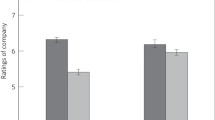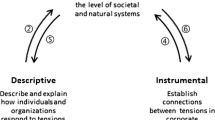Abstract
There is a systemic condition inherent in contemporary markets that compel managers not to pursue more morally preferable initiatives if those initiatives will require actions that conflict with profit maximization. Normative arguments for implementing morally preferable practices within the existing system fail because they are insufficient to counter-act the systemic conditions affecting decision-making that is focused on maximizing profit as the primary operational value. To overcome this constraint we must elevate a more normatively preferable value, ‚ideal environmental sustainability,’ to the level of being the primary filtering value through which other competing values are evaluated, prioritized, and implemented. In order for this to occur in practice, a change must be made relative to the laws, rules, and regulations that define and guide the market. This can be done by suitably defining the epistemic constraint of impartiality utilizing Rawls’ notion of a ‚veil of ignorance’ as a heuristic device.
Similar content being viewed by others
References
Alexander, J. K.: 2003, ‚Pragmatic Decision Making: A Manager’s Epistemic Defense’, Philosophy of Management, (December), 3(3), 67–77
Devall B., Sessions G. (1985) Deep Ecology: Living as if Nature Mattered. Layton, Utah, Gibbs Smith Publisher, pp. 63–108
Friedman, M.: 1970, The New York Times Magazine (New York Times Company, New York), 13th September
Leopold A. (1966) A Sand County Almanac. New York, Ballantine Books, pp. 237–264
Marcuse H. (1964) One Dimensional Man. Boston, Beacon Press, pp. 1–18
McGaa E. M. (ed) (1990) Mother Earth Spirituality. San Francisco, Harper Collins Publishers
McGaa E. M. (ed) (2002) Native Wisdom. San Francisco, Council Oak Books, LLC
Merchant, C.: 1992, ‚Environmental Ethics and Political Conflict’, Radical Ecology (Routledge, New York), pp. 63–82
Merchant, C.: 2000, ‚Partnership Ethics: Business and the Environment’, in P. H. Werhane and J. Reichart (eds.), Environmental Challenges to Business, The Ruffin Series No. 2, Society for Business Ethics, pp. 7–18
Naess, A.: 1973, ‚The Shallow and the Deep, Long Range Ecology Movements’, Inquiry 16, 95–100
Naess A. (1984) Defense of Deep Ecology. Environmental Ethics 6:3
Quine W. V. O., Ullian J. S. (1970) The Web of Belief. New York, Random House
Rawls J. (1973) A Theory of Justice. Cambridge MA, Belknap Press
Singer P. (1993) Practical Ethics. Cambridge, Cambridge University Press
Author information
Authors and Affiliations
Corresponding author
Additional information
John K. Alexander is an Adjunct at Grand Valley State University (Allendale MI) and Grand Rapids Community College (Grand Rapids MI). Areas of interest include Socratic, philosophy, business/organizational ethics, health care ethics, and philosophy of management. He has published papers in HEC Forum, Teaching Philosophy, Philosophy of Management, Journal of Business Ethics and Business Ethics Quarterly. Prior to becoming a visiting professor at GVSU in 2001, he had thirty-five years experience working and managing in foundries.
Rights and permissions
About this article
Cite this article
Alexander, J. Environmental Sustainability Versus Profit Maximization: Overcoming Systemic Constraints on Implementing Normatively Preferable Alternatives. J Bus Ethics 76, 155–162 (2007). https://doi.org/10.1007/s10551-006-9264-5
Received:
Accepted:
Published:
Issue Date:
DOI: https://doi.org/10.1007/s10551-006-9264-5




